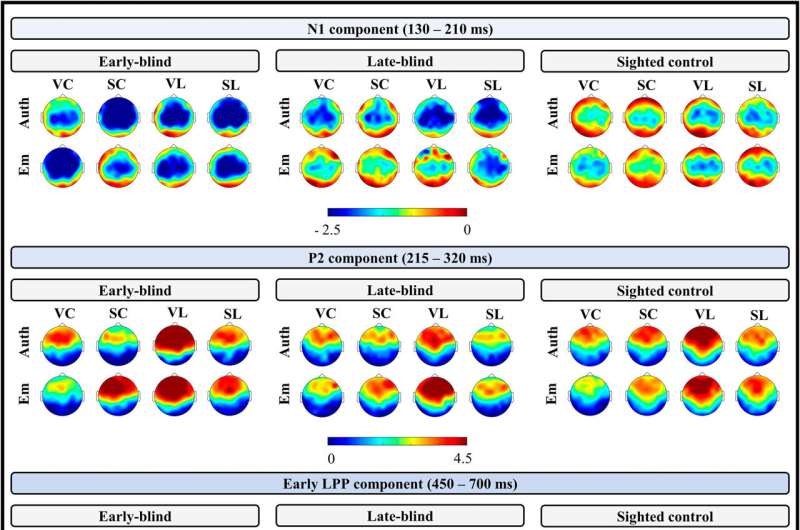This article has been reviewed according to Science X's editorial process and policies. Editors have highlighted the following attributes while ensuring the content's credibility:
fact-checked
proofread
How blindness affects the perception of whether an emotion is authentic or posed

A research team assessed the emotional authenticity perception in laughter and crying in participants who were born or became blind early in life and in participants who lost their sight later in life. The results showed that the late-blind participants performed worse in the assessment of emotional authenticity.
Human beings can express their emotions spontaneously, such as laughing and crying, but they can also regulate and voluntarily control them. Knowing how to differentiate when emotional expressions are authentic or simulated is an important social skill for everyone, but it is even more crucial for blind individuals since they cannot use facial and body language clues, relying their perception on vocal clues alone.
To assess whether sight loss affects blind people's ability to interpret others' emotions and intentions, as they often need to trust other people for support in their daily lives, Tatiana Conde and her team carried out a study to explore how blind individuals perceive emotional authenticity.
In the article "Blindness influences emotional authenticity perception in voices: Behavioral and ERP evidence," published in the journal Cortex, the researchers of the Faculty of Psychology of the University of Lisbon (PT) and University College London (UK) used a combination of behavioral measures and event-related potentials (ERP) to assess the perceived emotional authenticity in laughter and crying in 51 participants: individuals who were born or became blind early in life (n = 17), late in life (n = 17), as well as sighted control participants (n = 17).
All participants performed two tasks while EEG data was recorded. In one task the participants were instructed to discriminate the emotional authenticity of the stimuli and in the other task to discriminate the emotion (sadness vs. joy). The stimuli consisted of forced or authentic laughter and crying. The ERP analysis centered on three components: N1, P2, and late positive potential (LPP). These ERP components reflect different stages of vocal emotional information processing related to early sensory processing (N1), salience detection (P2), and cognitive evaluation (LPP).
Behaviorally the results revealed that early-blind participants showed intact authenticity perception, in opposite to late-blind participants who performed worse than controls. There were no group differences in the emotion discrimination task.
In brain responses, all groups were sensitive to laughter authenticity at the P2 stage, and to crying authenticity at the early LPP stage. Nevertheless, only early-blind participants were sensitive to crying authenticity at the N1 and middle LPP stages, and to laughter authenticity at the early LPP stage. Furthermore, early-blind and sighted participants were more sensitive than late-blind ones to crying authenticity at the P2 and late LPP stages.
"These findings suggest that prolonged visual deprivation with late-onset impairs the processing of emotional authenticity," says Tatiana Conde, opposing that "the early onset of visual deprivation seems to potentially lead to benefits in complex auditory abilities."
More information: João Sarzedas et al, Blindness influences emotional authenticity perception in voices: Behavioral and ERP evidence, Cortex (2023). DOI: 10.1016/j.cortex.2023.11.005



















